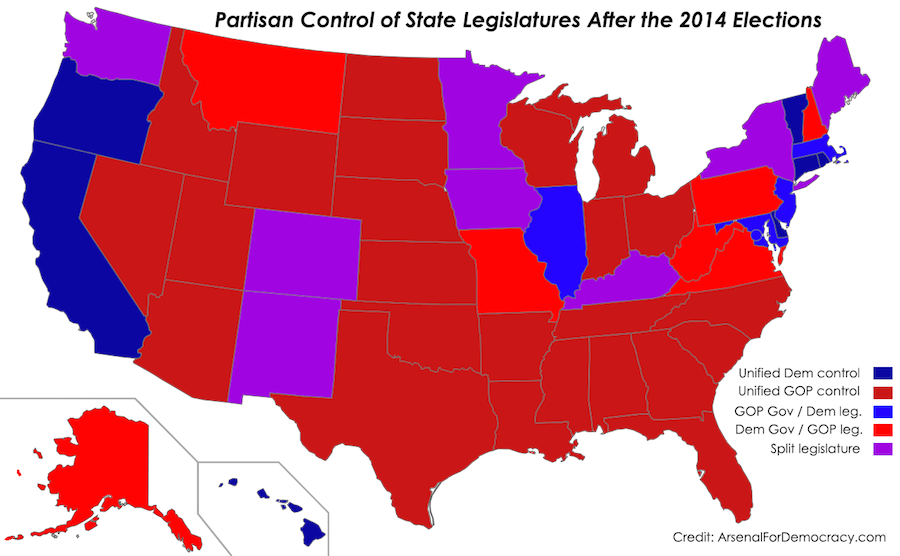 Facebook friend of mine Ken Gardner is fond of saying that a fair number of people who think they’re dissatisfied with Boehner and McConnell are really dissatisfied with the separation of powers. After all, any real change requires legislation, any legislation can be vetoed, and the Democrats in the Senate have proven that they won’t even let it come to that, with their abuse of the filibuster over the Iran deal.
Facebook friend of mine Ken Gardner is fond of saying that a fair number of people who think they’re dissatisfied with Boehner and McConnell are really dissatisfied with the separation of powers. After all, any real change requires legislation, any legislation can be vetoed, and the Democrats in the Senate have proven that they won’t even let it come to that, with their abuse of the filibuster over the Iran deal.
However, federalism plays as big a role as separation of powers. Our senators and representatives are from specific states and district, which can look very different from each other. In this respect, we are strikingly different from parliamentary democracies, even those such as Canada and the UK, where national slates really rule roost. In Will Mrs. Major Go to Hell?, William F. Buckley tells the story about a married couple, she from Massachusetts, he from Virginia. They discussed politics often, but never party registration. Turns out he was a Democrat, and she was a Republican, which came as a surprise to both of them. He being so conservative, she had assumed he was a Republican. She being so liberal, he had assumed she was a Democrat. Lots of fighting over that, apparently.
Those regional differences persist, even after the Great Reshuffling that began in earnest with the 1994 Congressional elections. The map that decorates this post, showing a broad swath of Republican legislative control across the country, masks a broad range of opinion and viewpoints. The Michigan and Wisconsin governments are run by Republicans, but I will promise you they are very different from Alabama and Mississippi.
That’s fine when you’re dealing with state issues. It comes into collision in Congress, where these regional Republicans have to sit in the same body.
When I was growing up, southern Congressional Democrats, who often voted conservatively, were referred to as “boll weevils,” while their northern liberal Republican counterparts were the “gypsy moths.” And it’s worth remembering that while Jesse Helms couldn’t have gotten elected in Minnesota, or Rudy Boschwitz in North Carolina, they both voted for the Reagan tax cuts.
What made it different was the “Reagan” part. Yes, the president has the veto power, but he also has the bully pulpit, and is the only office-holder elected by the entire country. He can set the agenda and give the party focus and direction in a way that it’s almost impossible for Congressional leaders to do.
There’s no question that Obama has broken the basic political agreement between citizens and the government:
Barack Obama has become the transformational president he aspired to be. Among the things he has transformed is the nature of the political compact between the rulers and the ruled in our republic.
Before Obama, citizens hoped that their elected leaders would be wise, independent, and disinterested leaders—but they never really counted on utopian vision. What they banked on was that the people they elected would, at the very least, be self-interested vote-seekers—so that if voters started punishing politicians for a specific course of action, the politicians would abandon it.
The passage of Obamacare broke this arrangement. And the impending passage of the Iran nuclear deal, in the face of voter discontent will cement this new relationship as the norm. In both cases, Democratic law makers went along in processes that were highly irregular (the nuclear option for passage of Obamacare; no treaty ratification with Iran); with initiatives they largely disliked on the merits; that voters demonstrably disliked in polling; and that had (or are likely to have) negative outcomes not just in the real world, but in the political world, too. This sort of power dynamic is new in American politics.
There’s also no question that Boehner and McConnell have been slow to recognize this shift, even as their opposite numbers on the Democrat side conspired in the reduction of Congress to an adjunct of the executive branch.
Whatever Boehner and McConnell may have “let” happen, real change will not come through Congressional action. It will have to wait for a Republican president, and even then, it will only happen with an energetic president committed to pushing legislation that devolves executive power back to Congress, reduces actual regulatory authority, and devolves federal power back to the states. It’s why primaries matter.
Obama is more Marius than Augustus, and we will not find our way back with a Sulla of our own. Sulla, of course, thought he was restoring the old order, but in the end, his lasting accomplishment was to establish a road map for future despots.



